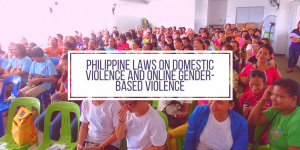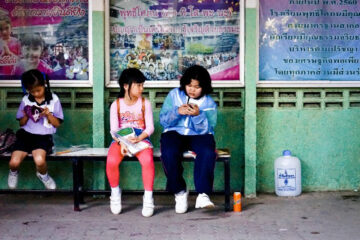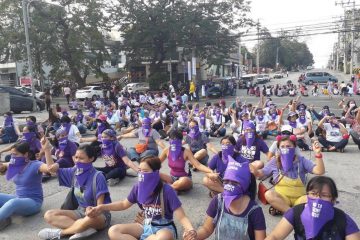 Domestic violence is one way in which unequal gender relations in Philippine society is manifested. It is an endemic issue that is continuously being addressed to end the normalization of a culture of violence against women. For years, the state has been spearheading legislation of anti-domestic violence laws in the Philippines for the elimination of all forms of violence against women and children both in public and private spaces.
Domestic violence is one way in which unequal gender relations in Philippine society is manifested. It is an endemic issue that is continuously being addressed to end the normalization of a culture of violence against women. For years, the state has been spearheading legislation of anti-domestic violence laws in the Philippines for the elimination of all forms of violence against women and children both in public and private spaces.
These laws include:
- RA 7877 Anti Sexual Harassment Act of 1995 – mandates primary protection under the law of the dignity of employees/applicants, and students declaring sexual harassment as an unlawful act in the workplace and educational and training institutions. Under this law, victims can file a sexual harassment complaint. Penalties include less than a month to more than half a year’s imprisonment and a fine of Php10,000 to Php 20,000.
- RA 8353 Anti-Rape Law of 1997 – Considered as a landmark legislation for women, RA 8353 provides a more extensive definition of rape as a criminal act. It defined rape as a public crime rather than its original legal provision from the Revised Penal Code as a private crime or a “Crime Against Chastity” where a woman’s loss of value and strained reputation and honor is highlighted more than the violation of her being. Reclassification of rape under this republic act meant that anyone with personal knowledge that the crime was committed can file a complaint against the rapist. It also penalized marital rape and even if charges are dropped by the victim, prosecution of the case could still continue in court. In some circumstances, it also considered rape as a heinous crime that can be penalized with reclusion perpetua and death penalty.
- RA 10364 Expand Anti-Trafficking in Persons Act of 2012 – Trafficking in person (TIP) is a violence of human rights committed by any natural or juridical person, from the process of recruitment up until receiving any person for illegal purposes such as prostitution, domestic and sexual exploitation etc. RA 10364 penalizes any person found guilty of acts of TIP (20 years imprisonment, fine of PHP1 million to PHP2 million), any person found guilty of acts that promote TIP (15 years imprisonment, fine of PHP500,000 to PHP1 million), qualified trafficking (life imprisonment, fine of PHP2 million to PHP5 million), and any person found guilty of committing attempted TIP (15 years imprisonment, fine of PHP500,000 to PHP1 million).
- RA 9262 Anti-VAWC Act of 2004 – penalises perpetrators of all forms of violence against women and children including physical violence, sexual violence, psychological violence, economic and abuse with imprisonment and a fine of 100,000 to 300,000 as well as mandatory psychological counseling or psychiatric treatment.
- RA 9710 Magna Carta of Women 2009 – As the local adaptation of CEDAW, Magna Carta is legislated to protect women’s rights and guarantees rights of all kinds of women from workers (farmers, informal and rural sector workers), the urban poor, military women, indigenous women, women with disabilities, to senior citizens and young girls. It ensures women’s equitable participation and representation in public and private sectors and promises to review amendments or repeal gender-discriminatory laws. It also seeks equal opportunities for women in education, the workplace and their livelihood, and social protection.The Magna Carta warrants women’s rights to food security, employment and education, affordable and safe housing, cultural identity preservation, and women’s inclusion to public fora and discussions in development and peace issues.
But despite the emergence of a shift in values and perceptions on violence against women of the state and its citizen, there is one space that holds grave danger for women; one that is yet to be fully-penetrated by legislators and individuals alike – the digital arena. Technology-based violence against women has become a distinct phenomenon because of the medium and the mode to which it is propagated. Cyberspace and the virtual space have been its platform, making women easier targets of a patriarchal structure at this digital day and age.
Internet and Communication Technologies (ICT) have been an essential space for women, especially for practicing their freedom of expression and freedom of information. The internet has paved the way for women to be heard, to assert their rights, their identity, and their being, and have been an avenue for better participation in their public life, that includes sharing their political and developmental stances. However, the fluidity of the internet has high risks, especially for women in technology who are susceptible to gender-based violence. An increase of the use of ICTs means a growth in harms and violations for women users who, as time passes by, are at the receiving end of the proliferation of technological rampage and assault. Insufficiency (or the lack thereof) in the attention and recognition of the consequences of the propagation of technology-based violence at alarming rates keeps women and young girls vulnerable and exposed on the internet.
A 2014 study conducted by Foundation for Media Alternatives (FMA) and Association for Progressive Communications (APC) delves in the gender-based violence on Philippine internet and found out that it “remains relatively unexplored and less understood and as such has implications on women’s access to justice.” Furthermore, the study describes ICTs’ “borderless nature, the fluidity of digital personhood, the absence of physicality, and the anonymity and intractability it offers” all of which affecting the manner by which such violence is “committed and perpetrated, but also its effects and consequences, and its subsequent prosecution or non-prosecution.”
In the Philippines, gender-based violence that happens online usually takes in the form of sex video and photo scandals and child cyber pornography. Intimate photos and videos dissemination online without consent spread at a fast rates, especially when the women are involved are famous. Problems arise when videos are uploaded without consent as a pornographic material in websites or reproduced into VCD/DVD formats, and from the fact that uploaders are untraceable by the victims which hinders them from identifying and confronting who published the video or photo online. As a result, victims are cyberbullied with hate speeches about their immorality and slutshaming. This creates a culture of victim-blaming instead of holding perpetrators of such a lascivious crime accountable. In other cases, children are the victims of technology-based violence through cyberpornography. Most of the time, minors are forced to earn by their own parents or relatives for their families. They are made to watch pornography in preparation for their performance of sexual acts in front of a computer. In effect, women are being harmed through emotional and psychological pain, the invasion of their privacy, tarnished reputations, fear of going to public places due to judgment and discrimination, and cyberbullying. To make things worse, their personal lives are also affected as their work relationships and sustainable source of livelihood feel the hit of the negative impacts of being looked down upon in their victimhood. For children victims, psychological disorders may be exposed in later parts of their lives. Boys have a higher risk of aggression while girls will be tolerant of all forms of abuse and the vicious cycle of violence is, yet again, normalised.
In the past year, rampant proliferation of gender-based violence took another shape on social media networks like Facebook where billions of Filipinos are users. A number of secret Facebook groups, many of which hide behind religious names, have been exposed for illicitly sharing obscene photos of women among members. In some instances, women and young girls are being included in private chat groups wherein they are being objectified and sexually harassed by a group of men. This led for the uproar of women to end the disturbing act of GBV. Senator Risa Hontiveros, an advocate of space spaces for women and children, filed the passage of Senate Bill No. 1251 or the Anti-Gender-Based Electronic Violence (GBEV) on July 2017 to penalize perpetrators of gender-based violence online including those of homophobic attacks on social media. In this bill, GBEV is defined as “acts involving use of any form of information and communications technology which causes or is likely to cause mental, emotional or psychological distress or suffering to the female victim or lesbian, gay, bisexual, transgender, queer (LGBTQ) victim, and tending to disparage the dignity and personhood of the same on account of his or her gender.” To date, this bill has been the only legislative measure to combat online gender-based violence in the form of harassment and threats in the cyberspace or any electronic means. The bill’s proposition of penalty is imprisonment of up to 10 years and a fine of Php100,000 to Php500,000.
But even before the passage of this Senate Bill, In the Philippines, there are ICT laws and policies that already exist. These laws include:
- RA 9995 Anti-Photo and Video Voyeurism Act of 2009 – prohibits recording and prevents reproduction, distribution, and publication of sexual videos or photos showing a sexual act, the male or female genitalia, and of the female breast, among others, without consent of the persons featured in the material. Penalties include imprisonment of 3 to 7 years and/or a fine of Php100,000 to Php500,000.
- RA 10627 Anti-Bullying Act of 2013 – addresses concerns of bullying of children among parents, teachers, and students victims of bullying in schools. Educational institutions are therefore required to design anti-bullying policies and programs to protect children from kindergarten to secondary school levels. Bullying can be written or verbal and can be done physically or through the use of electronics directly affecting the victim, instilling fear, and damaging the child physically, emotionally, and even his/her property. The act includes (a) cyberbullying through harassment, intimidation, humiliation, and threats with technology as its platform and (b) gender-based bullying, an act of exclusion or ridiculing an individual on the basis of sexual orientation and gender identity/expression.
Note: No law is made especially to combat cyberbullying but in 2015, House Bill 5718 Anti-Cyberbullying Act of was filed. (More info here: http://www.philstar.com/headlines/2015/05/27/1459305/anti-cyber-bullying-act-2015-pushed)
- RA 10175 Cybercrime Prevention Act – legislated for issues concerning online interactions and the Internet in the Philippines. Orginally, RA 10175 to penalized acts like cybersex, child pornography, identity theft and unsolicited electronic communication and content but it eventually included libels committed with computer systems. Penalties under the law include those guilty of cybersex (6 years to 12 years imprisonment or a fine of Php200,000 to Php1 million), child pornography (fine of P50,000 to P5 million, reclusion perpetua, or 20 to 40 years), and those found guilty of unsolicited communication/content (imprisonment for 1 month to 6 months, a fine of at least P50,000 but not more than P250,000, or both).
Despite these, there is still a lack of a human rights perspective and gender-responsiveness in Philippine ICT laws and policies. The law hardly ever accounts for technology-based violence against women despite the efforts to make it as flexible as possible and to be applied in prosecuting and used to address ICT-related violence against women. This goes to show that Philippine internet governance has a long way to go.
For more information, please click on the following links:
http://library.pcw.gov.ph/sites/default/files/gender%20violence%20on%20the%20internet.pdf
http://digitalfilipino.com/introduction-cybercrime-prevention-act-republic-act-10175/
http://cnnphilippines.com/news/2017/07/06/hontiveros-wants-to-penalize-pastor-hokage.html
This article was written by Gen del Castillo, researcher at the Foundation for Media Alternatives.
![]()



0 Comments